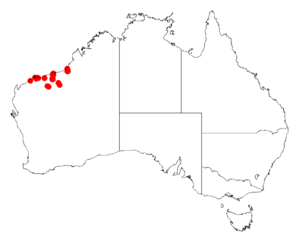Acacia glaucocaesia facts for kids
Quick facts for kids Acacia glaucocaesia |
|
|---|---|
| Scientific classification |
|
| Kingdom: | Plantae |
| Clade: | Tracheophytes |
| Clade: | Angiosperms |
| Clade: | Eudicots |
| Clade: | Rosids |
| Order: | Fabales |
| Family: | Fabaceae |
| Clade: | Mimosoideae |
| Genus: | Acacia |
| Species: |
A. glaucocaesia
|
| Binomial name | |
| Acacia glaucocaesia Domin
|
|
 |
|
| Occurrence data from AVH | |
| Script error: The function "autoWithCaption" does not exist. | |
Script error: No such module "Check for conflicting parameters".
Acacia glaucocaesia is a type of shrub or tree that belongs to the Acacia family. It's special because it only grows naturally in the northwestern parts of Australia. This means it is an endemic species, found nowhere else in the world.
What it Looks Like
This Acacia can be a thick shrub or a small tree. It usually grows to be about 1.8 to 6 meters (6 to 20 feet) tall. Its branches often have a white, powdery coating, almost like they've been dusted with flour. When the plant is young, it has small, spiny parts called stipules near its leaves.
Instead of true leaves, Acacia glaucocaesia has special flattened leaf stems called phyllodes. These phyllodes are usually thin and not very green, except when they are brand new. They are shaped like an oval or a narrow spearhead, about 1.5 to 2.5 centimeters (0.6 to 1 inch) long and 7 to 13 millimeters (0.3 to 0.5 inches) wide. They have a main vein that isn't very easy to see.
This plant blooms, or flowers, between July and September. It produces bright yellow flowers that grow in round clusters. Each cluster, called an inflorescence, can have 35 to 50 pale yellow flowers. After the flowers, the plant forms seed pods. These pods are narrow and oblong, growing up to 4 centimeters (1.6 inches) long and 12 to 13 millimeters (0.5 inches) wide. They also have that same powdery white coating as the branches. Inside the pods are shiny brown to black seeds, which are about 4 to 5 millimeters (0.16 to 0.2 inches) long.
How it was Named
The Acacia glaucocaesia was first officially described in 1926 by a botanist named Karel Domin. A botanist is a scientist who studies plants. Domin wrote about this plant in a scientific paper called Beitrage zur Flora und Pflanzengeographie Australiens.
Later, in 2003, another botanist named Leslie Pedley reclassified it, giving it a new scientific name: Racosperma glaucocaesium. However, in 2006, it was moved back to its original group, the Acacia genus.
Where it Grows
This Acacia species is native to the Pilbara and Kimberley regions of Western Australia. It likes to grow in areas that get flooded, often in sandy, clay, or loamy soils. You can find it most commonly in the western Pilbara region, especially between the De Grey River and Fortescue Rivers. Sometimes, it grows so thickly that it forms dense stands where almost all the plants are Acacia glaucocaesia. These are called monospecific stands, meaning "one species."

